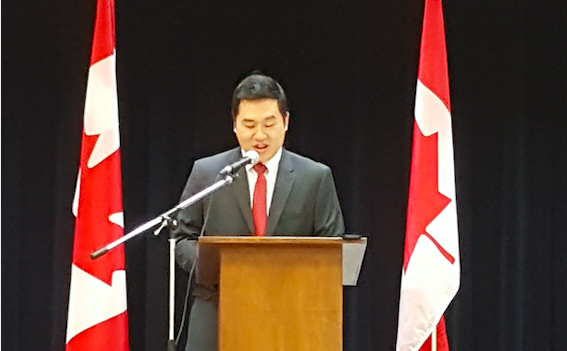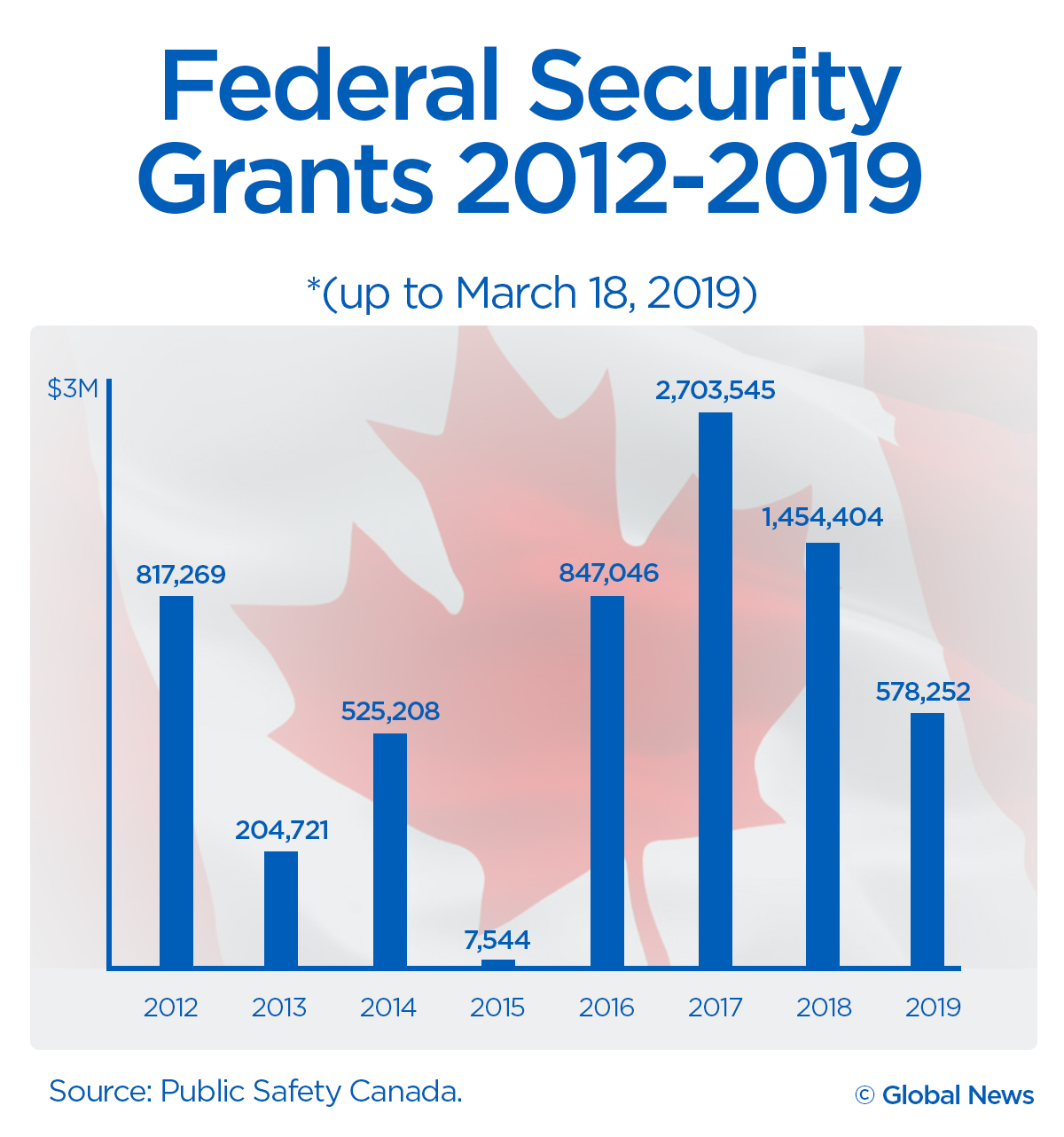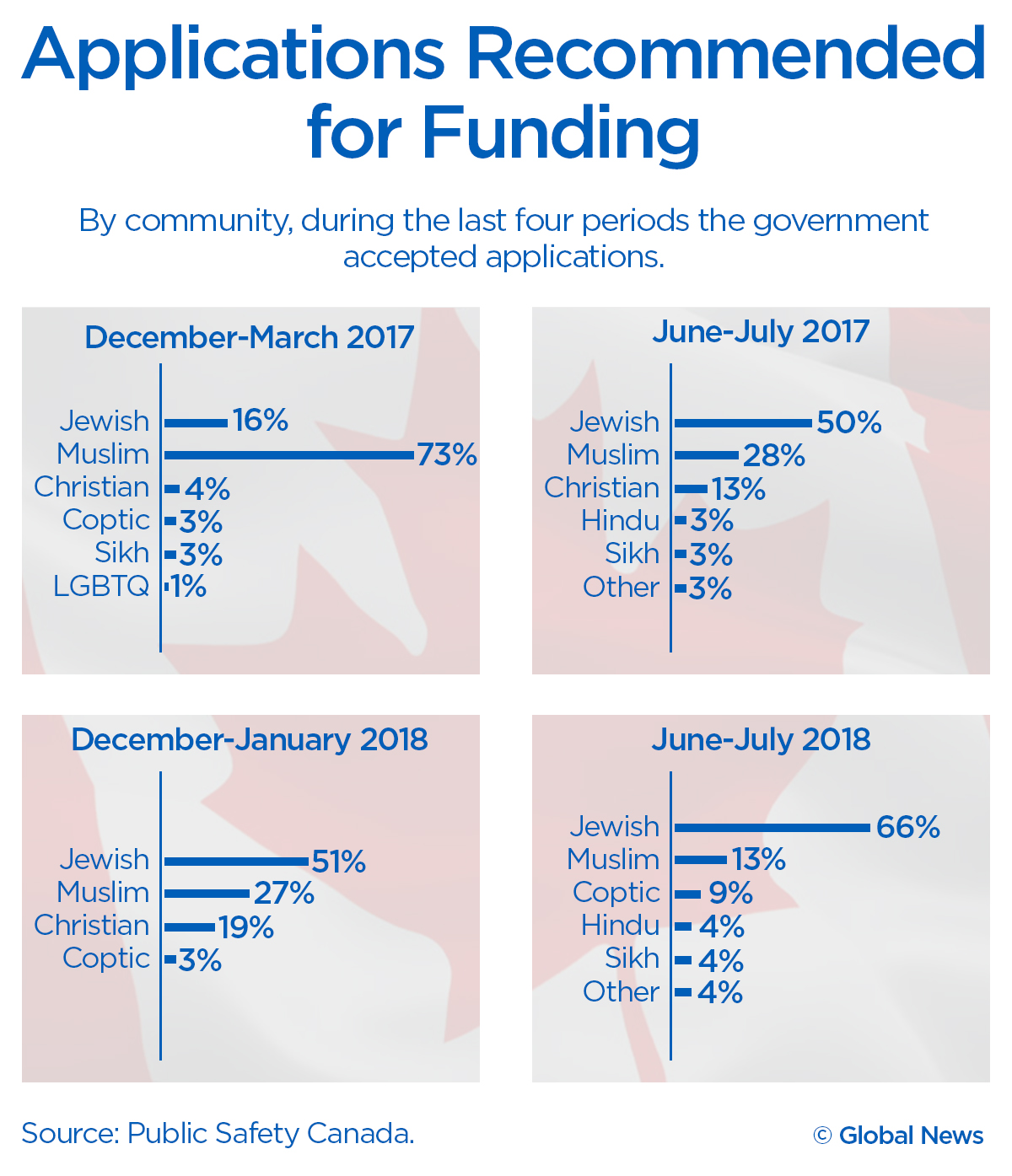Rabbi Jarrod Grover arrived at Toronto’s Beth Tikvah Synagogue one morning to find a red swastika and “Islam will rule” spray-painted on the building’s brick exterior.

Congregants were concerned. Some were Holocaust survivors. So the synagogue put other priorities on hold, and with the help of a federal security grant, installed new surveillance cameras.
“We had to assess our vulnerability a little bit and take a moment to realize that we’re living in times that are bringing out of a lot of hatred in people and that we’re a target,” the rabbi said.
Places of worship are supposed to be sanctuaries, but as recent events have made clear, they can also be hunting grounds for extremists with bombs and assault rifles.
Hate crimes ranging from the vandalism that Beth Tikvah experienced to the 2017 shooting at a Quebec mosque have led religious institutions to forgo open doors for security.
Surveillance cameras, alarms, access controls and vehicle barriers are becoming the new normal, and the federal government has been subsidizing the transformation.
Public Safety Canada has spent more than $7-million since 2012 upgrading security at religious institutions through its Security Infrastructure Program, which contributed $25,000 to Beth Tikvah.
Under the program, “community gathering places” deemed at risk of hate crimes can receive up to $100,000 for security equipment. The money covers 50 per cent of project costs.
In 2017, the government doubled the program to $2 million a year. Although spending actually declined in 2018 to $1.5 million, the 2019 budget again doubled the available money to $4 million annually.
“The additional funding will enable us to fund more types of support, such as training, which proved to be essential to saving lives during an attack on a synagogue in Pittsburgh in October,” said Scott Bardsley, Public Safety Minister Ralph Goodale’s spokesman.
A list, obtained by Global News, of the more than 200 groups that have received funding through the program shows that 90 per cent of the grant money went to the Jewish and Muslim communities — the top targets of religious hate crimes, but not the only ones.
And while most funding recipients were federally-registered charities in good standing, some were not, and the list includes three organizations whose top officials had stepped down following their arrests, one for killing his wife.
Also, tens of thousands worth of security grants went to two groups that were the subject of Canada Revenue Agency Charities Directorate audits that raised terrorism-related concerns and resulted in penalties.
A CRA audit completed in 2014 alleged the Islamic Society of North America-Canada may have provided resources to Pakistani militants fighting Indian forces in Kashmir.
But Public Safety officials nonetheless approved a $37,000 security grant to ISNA-Canada in 2017. Last September, the CRA suspended ISNA-Canada for one year and ordered it to pay a $550,000 penalty.

Get daily National news
In a statement, ISNA-Canada denied any links to terrorism and said it was grateful to have received federal security money. “We have many children and youth who attend our centre and we want to keep them safe.”
WATCH: New Zealand shooting: Survivors recount details of hiding from shooter

The Islamic Society of B.C also received a security grant, despite a CRA audit completed in 2016 that raised concerns about misspending and a relationship with a Qatari financier accused of funding Hamas.
In May 2017, the CRA levied a $9,000 penalty against the Society — whose former president is currently imprisoned for sexually assaulting a young worshipper inside the group’s mosque.
But three months later, public safety officials awarded the group $53,000 to buy cameras, an intruder alarm, anti-graffiti paint and other security measures, government documents show.
The grant application said the Port Coquitlam, B.C., mosque had reported a break-in, window damage “due to possible gunshot,” racist graffiti and bacon left on the doorstep.
The society has denied links to terrorism and the Qatar embassy in Ottawa said that while a controversial foundation in the Persian Gulf nation had financed the B.C. charity and held seats on its board, ties between the two groups ended in 2014.
Documents released under the Access to Information Act suggest public safety officials were caught off guard when Global News reported on the CRA audit findings in September 2017.
Hours after the story was published, an official sent an email to colleagues asking for confirmation the department was not funding the B.C. charity.
“I don’t think so, but I want to be certain,” he wrote.
But it was.
“How do we normally vet organizations to spot these types of issues before we give them money? We have no means of doing that,” an official wrote in an email after reading about the CRA audit.
“Did CRA flag this organization to us in any way? No.”
Weeks later, officials still seemed confused about the matter. After the Tri-City News reported that Public Safety Canada had given the group a security grant, an official wrote in an email: “Are we funding this organization?”
WATCH: 11 dead in Pittsburgh synagogue mass shooting

Another grant, awarded in 2017, went to an Ontario group whose charity status was revoked by the CRA in 2012 for failing to file tax returns.
Public Safety Canada said in a statement to Global News that it funded “projects, not organizations,” and had “measures in place to ensure the proper use of project funding.”
There are “other policy mechanisms in place to address non-compliance with the Charities Act and inciting hatred under the Criminal Code,” Bardsley said.
The Security Infrastructure Program began as a pilot project in 2007 and was formalized in 2012. Since then, annual spending has been inconsistent.
Spending swelled in 2017, as officials approved $2.7 million in grants — more than in the previous five years combined. Two-thirds went to Muslim organizations, amid the unease that followed the Quebec mosque attack.
In 2018, funding dipped again to $1.5 million, official figures show. As of March 18, $578,000 had been allotted in 2019 to 15 groups – two in Vancouver, one each in Calgary and Montreal and the rest in southern Ontario.

Jewish and Muslim organizations have made the most use of the program, receiving $3.5 million and $2.9 million respectively. The remaining $670,000 was shared among Christian, Sikh and other groups.
“Eligibility for the Security Infrastructure Program is not restricted to particular faiths,” Bardsley said. He added funding was available not only to places of worship but also for schools and community centres.
“Both Public Safety Canada and Members of Parliament have reached out to eligible communities to ensure those who need this support are aware of the program and its applications process,” he said.
But after a vandal sprayed Islamic State graffiti on the Lakeside Church in Guelph, the Ontario Provincial Police hate crimes unit investigated but nobody mentioned the program to administrators, a church official said.
“We didn’t apply,” said Jeff Groenwald, the church’s senior leader. “Didn’t even know about it.”
The Easter Sunday attacks at three Sri Lankan Catholic churches, followed by a shooting at a synagogue in Poway, California, are among the latest incidents to raise concerns about the targeting of religious institutions.
The synagogue had applied for a U.S. government grant to upgrade security. The grant was approved in March, but the new security measures had not yet been installed, the Associated Press reported.
In Canada, the country’s largest Jewish advocacy group has been asking Ottawa for changes to the Security Infrastructure Program, particularly since the Oct. 27, 2018, killings at Pittsburgh’s Tree of Life synagogue.
The Centre for Israel and Jewish Affairs said it wanted groups to be able to use the funds not only to purchase equipment like CCTV cameras but also to train staff and volunteers.
“Having an individual that knows how to react in a security situation, whether it be an active threat or a lockdown-type procedure, people that know what to do in emergencies, it’s invaluable,” said Ryan Hartman, CIJA’s director of community security.
“And having an individual that knows first aid, knows what information needs to be conveyed to first responders in an emergency, that to me is a true communal security multiplier, and that’s what I’m endeavouring to do.”
WATCH: Suspect throws rocks through Thornhill synagogue’s front doors

CIJA also wants the $100,000 cap raised, saying security has become more costly. In addition, it is asking provincial and municipal governments to fund some of the costs of hiring paid duty police officers.
Bardsley said the government was considering changes, including allowing funding to be used for training, and would “continue to listen closely to safety concerns of the Jewish community and other groups at risk of hate-motivated crimes.”
The cameras outside Beth Tikvah, which serves about 1,200 families, are deliberately conspicuous. They are meant to be seen. They are meant to deter. The ones inside are more subtle.
Rabbi Grover said the federal matching grant had allowed the synagogue to “stay focused on what we’re really here to do.”
But he said it would make sense for the government to invest in all aspects of security, like the guards employed by the facility.
“Those guards are more effective than cameras, I’ll tell you that,” he said.










Comments